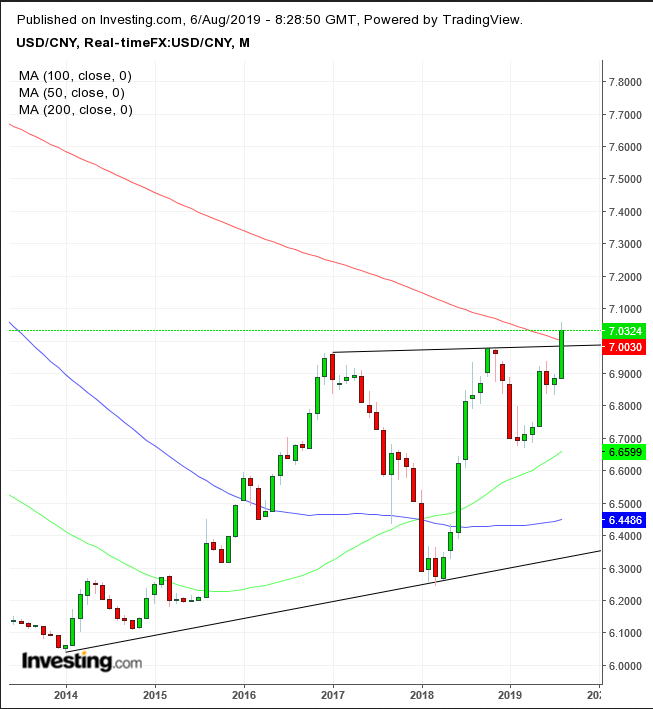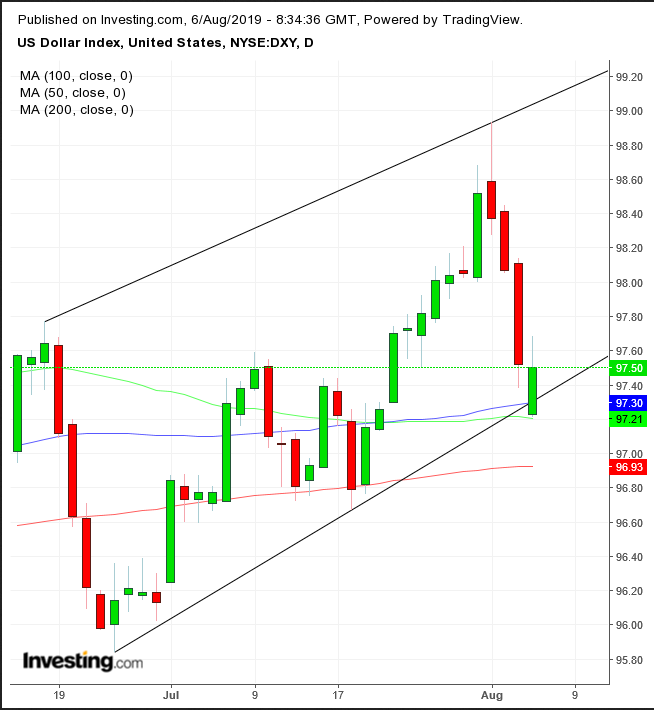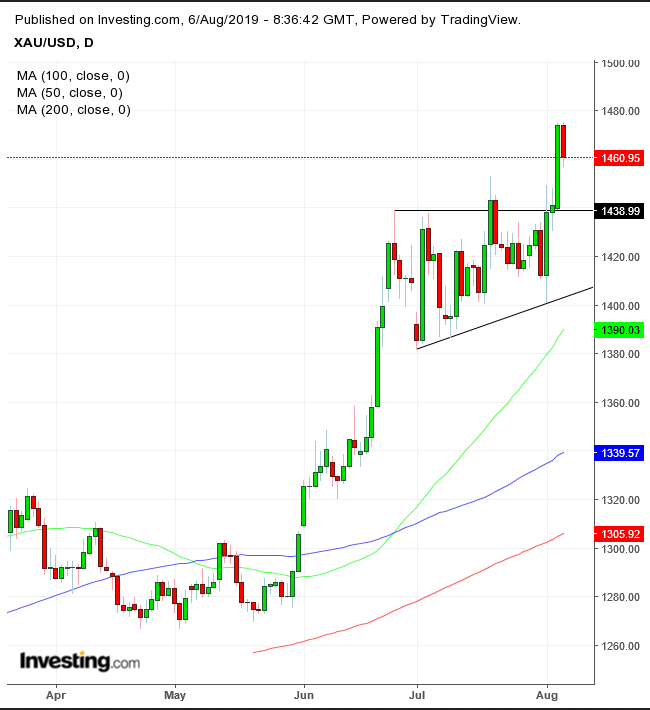Key Events
Futures on the S&P 500, Dow and NASDAQ 100 and European shares edged higher this morning after Asian shares lingered in red territory but managed to bounce off their lows, as Chinese policymakers took action to limit the yuan plunge.

The global decline eased after the People's Bank of China set the daily currency fixing above the 7.000 red-line mark, whose breach yesterday—for the first time in ten years—sent a clear retaliatory signal to the U.S. administration, after President Donald Trump pressed ahead with a 10% tariff on $300 billion worth of remaining Chinese imports last week.
The yuan's tumble in turn prompted the U.S. Treasury Department to label its trade opponent a currency manipulator late on Monday.
Technically, the renminbi is still weaker than the 7.000 level, and remains above the 200-month MA for the first time since 2007.
In the early session, Asian markets stocks pared the selloff—but remained in red territory—after Chinese officials denied they would use the domestic currency as a trade war weapon.
Australia’s S&P/ASX 200 (-2.44%) dropped for the fifth day, underperforming on the U.S.-Sino trade spat escalation. The Aussie benchmark missed on the opportunity to trim losses, closing before Chinese policymakers' currency intervention. Meanwhile, the country's currency gained for the first time in twelve days after the Reserve Bank of Australia kept rates unchanged at record lows, as expected, and said it was reasonable to expect that “an extended period” of low rates will be required. Local bonds rallied, sending the 10-year yield below 1% for the first time on record.
Elsewhere, Japan’s Nikkei 225 (-0.65%) hit a 7-month low.
Global Financial Affairs
Yields on 10-year Treasurys partly reversed a drop but remained close to their lowest level since Oct. 2016, which fully erased the so-called Trump Trade on Monday.

The U.S. dollar also reduced losses to almost flat, confirming the channel bottom since late June, guarded by the 50 and the 100 DMA.

In a mirror image, gold gave up gains after an upside breakout to an ascending triangle, which had taken it to the highest price since Apr. 2013.
The yen also pulled back after closing at its strongest level in more than one year on Monday.
Oil edged higher, recovering from the U.S.-China trade tit-for-tat, which threatened to deal a further blow to global growth and thereby to global fuel demand. The U.S. declared a fully-fledged economic embargo against Venezuela, helping prices higher.
Bitcoin advanced, with its week-long rally taking the digital token above $12,000 on Tuesday for the first time in three weeks. Technically, the digital coin is breaching its falling channel.
Up Ahead
- A string of FOMC voting members speaks this week, including St. Louis's James Bullard on Tuesday and Chicago’s Charles Evans on Wednesday.
Market Moves
Stocks
- The U.K.’s FTSE 100 slid 0.4% to the lowest in two months.
- Germany’s DAX climbed 0.3%.
- The MSCI Asia Pacific Index dropped 0.8% to the lowest in almost seven months.
Currencies
- The Dollar Index was little changed, rebounding from a 0.32 drop.
- The euro was little changed at $1.12.
- The British pound edged 0.3% higher to $1.2174.
- The Japanese yen declined 0.6% to 106.63 per dollar.
- The onshore yuan gained 0.2% to 7.036 per dollar, the biggest increase in more than three weeks.
Bonds
- The yield on 10-year Treasurys ticked five basis points higher to 1.75%, the biggest increase in more than three weeks.
- Britain’s 10-year yield climbed one basis point to 0.52%, the first advance in more than a week.
- Germany’s 10-year yield fell less than one basis point to -0.52%, reaching the lowest on record with its eighth straight decline.
Commodities
- Gold dropped 0.2% to $1,460.40 an ounce.
- West Texas Intermediate crude climbed 0.7% to $55.10 a barrel.
